2023/2024: A Hero's Journey
A look back through PTE's 23/24 Season reveals the necessary, narrative impact of change.
On May 19, PTE closed its 2023/24 Season with a presentation of The Outside Inn, a Festival Antigonish production by Sharon Bajer and Elio Zarrillo. It’s a fitting season closer, not only because the seeds for the show were first planted here, in Winnipeg, but also because it openly tackles themes of change, transformation and transition. These are themes that were present in various ways throughout the season, and that all of us, inside and outside the theatre world, are likely grappling with currently in some form or another.
Joseph Campbell originally theorized that the monomyth – otherwise known as The Hero’s Journey – is an essential structural archetype in effective storytelling. It’s a narrative structure that involves many possible plot points and phases, but it can be summarized in three basic parts:
Departure – Initiation – Return
In short, the hero’s journey is a transformation, which is earned by going through challenges; by doing hard things. Through storytelling, we can apply this framework to all kinds of scenarios, and through empathy and imagination, we can take on the lessons and the values woven into those stories, allowing us to evolve more efficiently, both as individuals and as a collective.
Looking back chronologically at the 23/24 Subscription Series, we can see how the characters on stage pass through these three phases, but if we zoom out, we can also apply the same overarching journey of transformation to the season as a whole.
Change is inevitable, and often uncomfortable, but by exploring the phases of transformation and transition on stage, we can create links and pathways that we wouldn’t otherwise see. In this way, theatre can become an essential tool for both processing and creating change.
“If you want to help this world, what you will have to teach is how to live in it.”
–Joseph Campbell
Part 1: Departure
Within the monomyth, departure marks the moment where the protagonist feels called to adventure…or perhaps is forcefully shoved into one. In either case, the protagonist crosses a threshold, separating from the life they have known in order to pursue change (or to keep up with it).
FEAST
Who are we? What are we to do?
In October 2023, the season opened with Guillermo Verdecchia’s Feast, a PTE World Premiere. Set in present-day, and addressing all the current, cultural complications that come with that, the Winnipeg Free Press described the production as a “gripping exploration of transience and malleability of place on an increasingly unbalanced planet.”
In this description alone, we get the sense that Feast is about change. More specifically, it’s about how we respond changes outside of our control. Even David Oro’s set design, a minimalist, bone china dinner plate, turns constantly throughout the show, forcing its characters to either keep up, or be carried along. The characters find themselves in a changing environment and a changing society, with rapidly changing values. Upon realizing it, each sets out, in their way, in pursuit of a grounded sense of meaning, place, and purpose.
When asked what Feast was about, Verdecchia described it as being about endings; “The end of the world, and the end of a family,” he said. “And perhaps the end of a kind of magic, or a kind of poetry. Who are we? What are we to do? What is important, given these enormous challenges?”
This ending, or departure, is the crux of the story, as well as the lesson we take from it. When society, or the planet, no longer supports our source of meaning, who, or what, will we become?
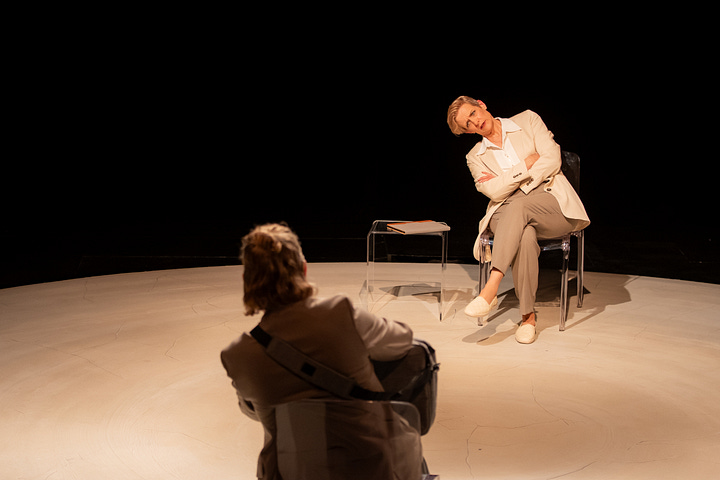

Whether any of the characters in Feast succeed on their personal journeys is left unclear. We don’t get a conclusive moment of reunification or completion, because for us as the audience, the resolution is less relevant than the departure itself, because most of us are caught in and around that moment of departure right now.
As the season opener, Feast was perfectly positioned to serve as a call to adventure for each of us to reflect on where we are in our own hero’s journey, and what a future return could look like.
In terms of the Season’s overarching narrative, we were just getting started.
Part 2: Initiation
Initiation represents the challenges that a potential hero undergoes in order to complete their personal transformation. It’s the largest piece of the monomyth pie, and involves meeting new friends and/or enemies, undergoing trials and/or tribulations, and often a “supreme ordeal,” usually a significant loss or a sacrifice.
This season, it just so happens that in The Waltz, Diggers and The Year of Magical Thinking, we got three great examples of initiation in action.
THE WALTZ
We are here. Now what?
The Waltz is a sequel of sorts to Marie Beath Badian’s Prairie Nurse, taking place 20-odd years after the events of the first play, in the now-nostalgic nineteen-nineties. Badian described it as a coming-of-age rom-com, and a love letter to the “infinite potential” of the Saskatchewan sky, as well as one part in an immigration story spanning generations.
“I like to think that the true story of immigration is sewn over generations: The We Are Here. Now What?” Badian wrote in the program notes for PTE’s production, “I marvelled at the prairie sky at dusk … all her possibilities. It struck me that under that sky was the next chapter of this Prairie Nurse story: The Now What?”

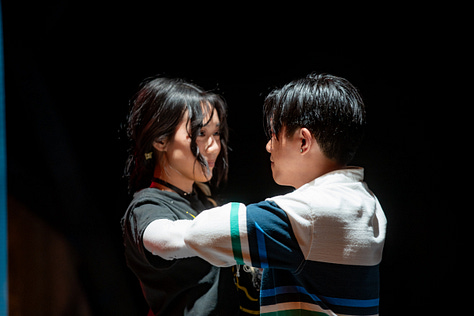

Whereas Feast responds to individual reactions to a global experience, The Waltz hones in on an individual experience – transitioning into adulthood, figuring out who you are – and the universal experience of encountering somebody on your path who sees you the way you hope to be seen.
Becoming an adult is all about testing your sense of identity, who you are and who you hope to become. When we encounter somebody who reflects back to us the person we see, or hope to see in ourselves, it can be an incredibly empowering, inspiring, even life-changing experience, and when we meet our two heroes in The Waltz, this is exactly what we see play out.
Bea and RJ meet shortly following their respective departures from their former lives, as remarked by the show’s director, Nina Lee Aquino, “One is running away from something, and one is running toward something.” Though their plans and motivations don’t exactly align, it’s the event of their meeting that initiates real change in each of them, allowing them to open up to one another and themselves.
Over the course of the show, thanks to each other, we see both Bea and RJ step out of their comfort zones and into the unknown. By the end of the show, the path ahead of the two teens is still in shadow, but as an audience blessed with the knowledge of how deeply intertwined their lives are, we’re left with the sense that after having met, each of them is closer to who they are meant to become.
DIGGERS
Somehow, you’ve got to find yourself in this.
Diggers by Donna-Michelle St. Bernard is an examination of how change impacts a community and, ultimately, how a community can shape change. In an interview with the Winnipeg Free Press, St. Bernard described her writing the show as being an interrogation and a search for understanding, “trying to understand the context of certain decisions being made, and the options these people have available to them.”

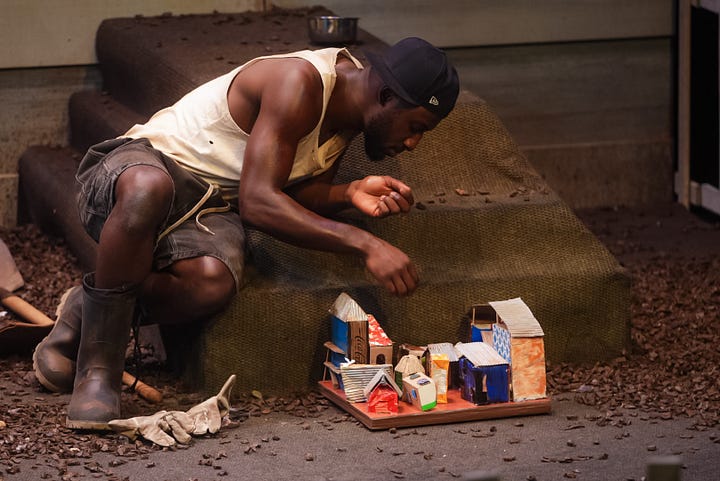
The three grave diggers that we follow through the story are literally separated from their community, exiled to the top of a hill as disease sweeps through their town. Solomon, Abdul, and Bai each have their own way of grappling with the seemingly endless changes raining down on them. Solomon, the oldest, has relaxed into change, having learned to accept it, whereas Abdul is rigid and resistant to change. Bai, the youngster, is only able to unite the group by adding balance to their dynamic and introducing a sense of creativity – the realization that with their combined efforts, the diggers can actually shape the changes taking place around them, and even within them.
There is one moment where Solomon offers some of his wisdom to his younger counterpart, telling him, "Somehow, you've got to find yourself inside this. Our community, our system, how we move together. It matters."
Therein lies the message that Diggers teaches us about change. Despite our individual hardships, sacrifices and perceived slights, a community bares a far better chance of withstanding the inevitability of transformation than one hero on a solo journey.
THE YEAR OF MAGICAL THINKING
How do we carry on?
The Year of Magical Thinking was one of PTE’s most popular shows this season, and it’s no surprise why. Joan Didion’s powerful memoir about grief has been a best-seller almost since its publication in 2005. As far as trials and tribulations go, it doesn’t get much worse than the kind of loss Didion experienced, which has made the book (and the subsequent one-woman-show) famous for its ability to help people move through the transition of grieving a loved one.
As we did in Diggers, in The Year, we examine a character’s response to change out of her control, but whereas the community in Diggers was ultimately able to adapt and effect change together, ‘Joan’ must learn to let go of her community and her support system, knowing that they won’t come back. Alone, she grapple with the internal process of grief – a journey in and of itself, and about the most grueling one imaginable, for many of us.
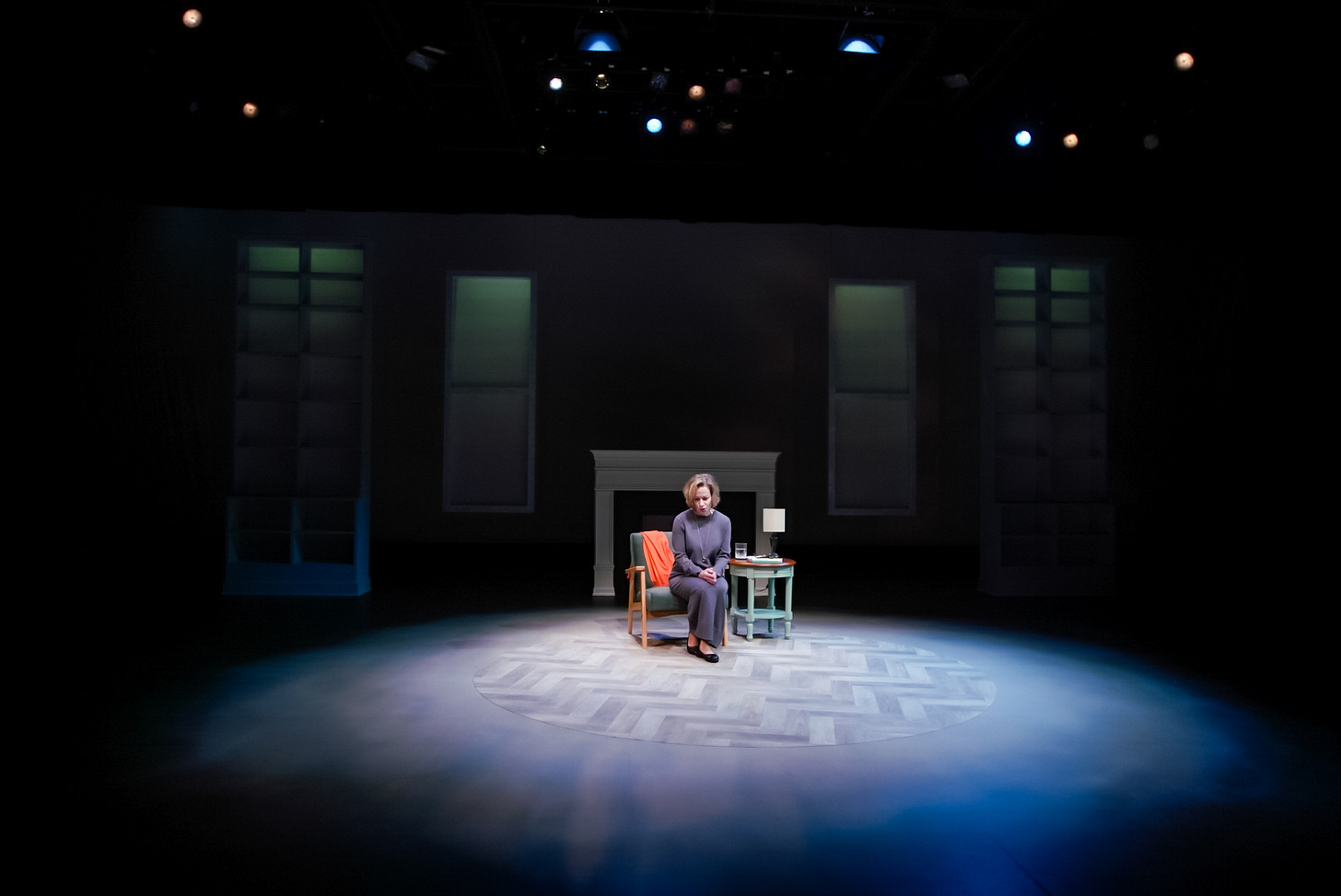
In Rodrigo Beilfuss’ Director’s Notes for The Year of Magical Thinking, he remarked on this central conflict in the memoir and on stage, writing, “Loss. We all know what it feels like, but few of us know how to actually talk about it, or how to processes it. Thank goodness Joan Didion found the words.” He ended his notes with a passage from Didion herself:
I’m not telling you to make the world better, because I don’t think that progress is necessarily part of the package. I’m just telling you to live in it. Not just to endure it, not just to suffer it, not just to pass through it, but to live in it. To look at it. To try to get the picture. To live recklessly. To take chances. To make your own work and take pride in it. To seize the moment.
The experience of loss is one of the deeply personal, yet universal experiences of transition that we move through as humans. An external change, completely beyond our control, becomes a call-to-action for us to reimagine who we are and how we exist in the world, and to continue to grow with - not away from - the memories and lessons gathered along the way.
Part 3: Return
In monomyth theory, Return marks the hero’s journey back to the life or circumstances they left behind, having now been changed by their experience and the challenges they’ve overcome. It usually involves the resolution of the conflict that caused the departure in the first place.
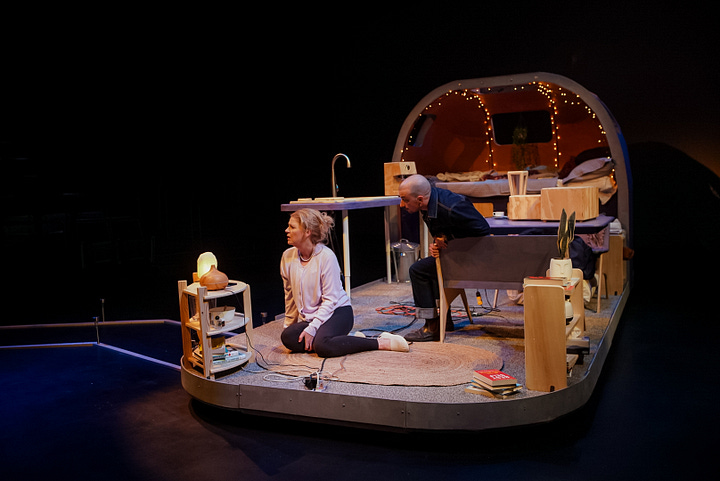
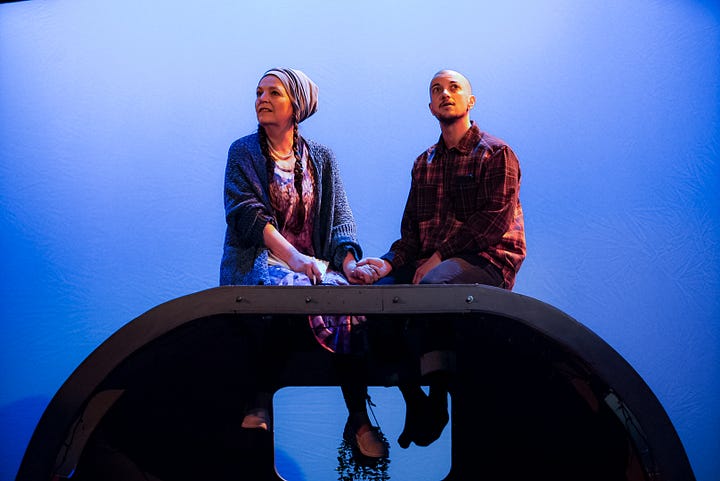
THE OUTSIDE INN
What happens when we’re called upon to support a loved one through change?
In The Outside Inn, PTE's Season closer and a collaboration between Sharon Bajer & Elio Zarrillo, we meet two characters, Lily and Patrick, a mother and child who are reunited after a long period of separation, both having been through trials, but neither quite ready to cross the threshold back into their familial bond. Not, that is, until they are each ready to take the final steps of their personal transformations. It just so happens that these steps, for both characters, lead them right back into one another’s lives. What we witness on stage is, literally, the return of Patrick to their mother's front door, and eventually, the return of their relationship.
In the program notes for the show, director Annie Valentina mused, “What happens when we’re called upon to not only witness, but support a close family member through drastic life change? Change that asks us to reexamine our own stakes in who they’ve always been?”
When we’re called upon to support a loved one through change, it acts as a miniature call-to-adventure for us, sometimes instigating change within us that then feeds the other. Evolution begets adaptation, which begets more evolution.
Despite their familial bonds, Lily and Patrick cannot reach a true connection with one another without first undergoing their own hero’s journey. The return of their relationship By going through their own transformation, they learn to see, accept, and support each other in a way that resonates.
Sometimes in order to create positive change, things appear to get messier before they begin to improve. The Outside Inn demonstrates how the effects of one change can provoke further change, and how following our internal calling is the best change that we can make in our lives, and even in the lives of our loved ones. Change can separate us, but it can also unite us. All we need to do in order to reach the other side is persevere, to complete the cycle.
Conclusion
Storytelling teaches us about change on many different levels. As the world around us continues to change at an exponential rate, it’s possible that we need theatre, and art in general, more than ever before. In order to navigate the changes ahead of us, our experience as a collective will become much more powerful than our experience as individuals. By witnessing and empathizing with one another, we take on the lessons and the wisdom of the other, making us more prepared. Participating in storytelling by bearing witness theatre is a tool for processing change, creating change, and evaluating change.
seeing the hero’s journey play out before us, bearing witness to the protagonist’s mental and emotional transformation allows us to go through that transformation, to some extent, along with them. as such, we are emboldened, as empathic creators and consumers of theatre, to apply the many lessons and perspectives we have learned.
As Joseph Campbell himself once said, “If you want to help this world, what you will have to teach is how to live in it.”
If you’re interested in theatre as a tool for creating social change, Canada’s National Arts Centre’s Stages of Transformation project is a great exemplary resource.
If any of this season’s subscription or add-on shows helped you through a change in your life, or inspired you to create one, we’d love to hear about it in the comment section of this post!




